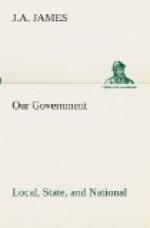Section I, Clause 7. I do solemnly swear (or affirm) that I will faithfully execute the office of President of the United States, and will to the best of my ability preserve, protect, and defend the Constitution of the United States.
[Footnote 42: It is frequently urged, with good reason, that this date should be changed to a time of year when the weather in Washington would be more favorable. An amendment, recently sanctioned by the Senate, provides that the date for the inauguration shall be the last Thursday of April. The chief objection to this change seems to be the further extension of time between the election and the assuming of duties.]
It has been established, by custom, that the oath shall be administered by the Chief Justice of the United States, at the east front of the Capitol. After taking the oath the President gives his inaugural address, which outlines the policy he purposes to carry out. Immediately after his inauguration, unless it be his second term, he calls the Senate together, and places before it his nominations for members of the cabinet, and for such other important offices as he may desire to make.
SUPPLEMENTARY QUESTIONS AND REFERENCES.
1. Which of the Presidents have served two terms? How was their election for a second term to be accounted for?
2. The method of calling National political conventions. When held? Questions considered. Make a study of the last convention. Cosmop., 29: 194-200; Scribner’s Mag., 27: 643-656.
3. Under what conditions was the first platform of a National convention agreed upon? Wilson, Division and Reunion, 63.
4. For the work of the National committee, see Rev. of R’s, 22: 549-556; 556-563.
5. The power of the chairman of the National committee is discussed in Atl. Mo., 89: 76-81.
6. What was the probable origin of the system of electing the President by electors? Harrison, This Country of Ours, 78; Fiske, Critical Period of American History, 66, 280-289.
7. For the methods which have been used in electing a President, see N. Am. Rev., 171: 273-280.
8. Should the President be elected by direct popular vote? N. Am. Rev., 171: 273-280; 281-288; Scribner’s Mag., 27: 643-656.
9. For some of the problems connected with the electoral colleges in the history of elections, see Rev. of R’s, 23: 66-69.
10. What is the method used in counting the electoral votes? Edmund Alton, Among the Lawmakers, 88-89.
11. Do you agree with Mr. Bryce that the tendency is to select for President men who have not been prominent? Bryce, American Commonwealth, I, chap. 8.
12. Was the present President notable before his election? In what ways?
13. What were the chief causes for the success of his party?
14. How many electoral votes were required for election? He received how many? Did he receive a majority of the popular votes? Election of 1900, Rev. of R’s, 22: 673-674; 655-658.




